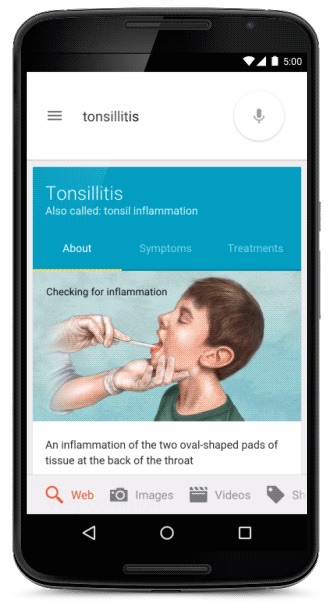 By better leveraging its Knowledge Graph smart search algorithm, Google is giving its health-related search functions a shot in the arm. Starting in the next few days, health searches on Google and via the Google app will display a wide range of medical facts about the disease or condition in question.
By better leveraging its Knowledge Graph smart search algorithm, Google is giving its health-related search functions a shot in the arm. Starting in the next few days, health searches on Google and via the Google app will display a wide range of medical facts about the disease or condition in question.
"We’ll show you typical symptoms and treatments, as well as details on how common the condition is—whether it’s critical, if it’s contagious, what ages it affects, and more," product manager Prem Ramaswami wrote on the Google Blog this week. "For some conditions you’ll also see high-quality illustrations from licensed medical illustrators. Once you get this basic info from Google, you should find it easier to do more research on other sites around the web, or know what questions to ask your doctor."
Knowledge Graph is a function of Google Search, introduced in 2012, that combines Google's search algorithm with publicly available and internal databases to create a "smarter" search. With Knowledge Graph, a small display of relevant information shows up at the top of a user's search results page. Google first started using Knowledge Graph with health-related search results in 2012.
The information Knowledge Graph will display is gathered from well-regarded medical websites has been vetted by a team of doctors, both internal at Google, led by Dr. Kapil Parakh, and at the Mayo Clinic.
"That doesn’t mean these search results are intended as medical advice," Ramaswami added. "We know that cases can vary in severity from person to person, and that there are bound to be exceptions. What we present is intended for informational purposes only -- and you should always consult a healthcare professional if you have a medical concern."
Ramaswami writes that 1 in 20 Google searches is health related, and Google has been aware of this fact for years. At various times since 2009, Google has updated its search features to be more friendly to health-related searches. In November 2010, Google wrote a blog post officially introducing special search results for people using Google in an emergency situation.
“We know that in times of crisis, it’s especially important for you to find the crucial information you’re looking for -- and find it fast,” Dr. Roni Zeiger, Google’s then Chief Health Strategist wrote at the time. “Today, in 13 countries, we’ll begin displaying some combination of special search results for searches around poison control, suicide and common emergency numbers that point to emergency information.”
In fact, Google had rolled out special search results — a large, prominently displayed phone number — for poison- and suicide-related searches as early as the fall of 2009. The company added special results for emergency-related terms in various languages as well.
In February 2012, Google changed how search worked for people who seemed to be looking for information about medical symptoms, displaying a short list of related conditions.
“The list is generated by our algorithms that analyze data from pages across the web and surface the health conditions that appear to be related to your search,” Zeiger wrote in a blog post at the time. This search protocol has been modified somewhat since then. It now displays the message “Consult a doctor if you have a medical concern” in response to symptom searches.
In November 2012, Google added medication concerns to its roster of special searches. This time Adam Brown, the former Google Health product manager wrote the blog post for the feature, which was the first to tie in health searches to Knowledge Graph.
“We get a lot of queries for medicine on Google. So to make it quick and easy for you to learn about medications, we’ll start showing key facts — side effects, related medications, links to in-depth resources, and more — right on the search results page,” he wrote. Medication searches also display the “consult a doctor” disclaimer.
The most recent health-related change to search was nutrition-related. Starting in May of 2013, Google search begain to answer questions about the nutritional content of food, even making connections between foods with unlike-sounding names like summer squash and zucchini.
Last year Google also experimented by inviting some health information searchers to video chat with a physician. The video chats were part of Google's Helpouts service. The October experiment, however, was just a temporary search feature.



















